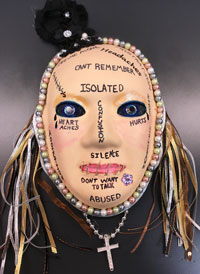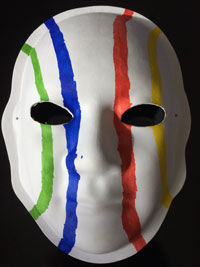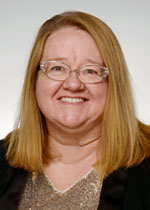Unmasking Brain Injury
The North Dakota Brain Injury Network's Unmasking Brain Injury project helps survivors of TBI cope with their "new normal" and tell their stories through art.
By Brenda Haugen on
In a typical year, about 5,500 North Dakotans sustain traumatic brain injuries (TBIs). TBIs are caused by external impacts, usually violent blows to the head, and may occur in a variety of ways, from car accidents to falls to assaults. Brain injuries can also result from non-traumatic means, such as strokes, aneurysms, or oxygen loss.
But the results of brain injuries can't always be seen. They may include everything from head, neck, and shoulder pain to memory loss, anxiety, depression, and the inability to focus on one topic. Many of the more than 13,000 North Dakotans living with long-term disabilities from TBIs must cope each day with the fact that these types of injuries aren't readily apparent.
Deanna G., for instance, sustained a TBI in a car accident and was told she'd never walk again. After using a wheelchair for about six years she learned to walk again but still had to work hard to read, write, and do math.

"Please, people, realize we are people too, and we need help. It's a hurt no one can see. A SILENT DISEASE," wrote Deanna, who despite her victories struggles with the fact that people often cannot see the effect her TBI continues to have on her life.
Now, Deanna and other brain injury survivors are finding their voices through the Unmasking Brain Injury project, which was launched by the North Dakota Brain Injury Network (NDBIN) in January 2017. Through Unmasking Brain Injury, NDBIN provides art supplies—masks, paints, and other materials—to survivors, who can tell their stories through personalized masks.
The purpose of the mask is to remind viewers that brain injuries are often invisible. This shows the injury inside in a visible way.
"The purpose of the mask is to remind viewers that brain injuries are often invisible," said Rebecca Quinn, program director of NDBIN. "This shows the injury inside in a visible way."
Not only do the masks educate others about what it is like to live with a brain injury, they also provide a creative, therapeutic outlet for survivors.
Since the project's inception in North Dakota, more than 70 brain injury survivors have created masks; NDBIN has hosted 11 events across the state for people to create masks. The organization also mails masks to individuals, along with a lesson plan that walks them through the process, if they are unable to attend a larger event.
Taylor B. deals with a brain injury he sustained after repeated concussions.
I struggle with the new person I am today and everyday life struggles that come with the injuries. I'm trying to find myself in a different person.
"I've sustained five severe concussions within two years," Taylor noted in the write-up accompanying his mask. "I struggle with the new person I am today and everyday life struggles that come with the injuries. I'm trying to find myself in a different person. I am very thankful for the little but yet oh-so-big improvements I've made."
Along with providing TBI survivors an outlet to share their pain and struggles, the Unmasking Brain Injury project also gives them the opportunity to show there is hope.

Shannon B. sustained a TBI in 2010 in an accident involving a horse.
"I feel that everyone's brain is their hard drive, and when your hard drive blows up, everything is now very complicated," Shannon explained in reference to her mask. "My hard drive blew up, and I had to re-wire my brain so I could function again. I prayed for God to give me back brains and hair, and He answered by making me a walking miracle."
Since 2013, NDBIN has worked statewide to raise awareness about brain injury prevention. Funded by a contract with the North Dakota Department of Human Services, NDBIN also helps people with brain injuries—and their families and caregivers—navigate the service system. Located in the Center for Rural Health at the University of North Dakota School of Medicine & Health Sciences, NDBIN provides personalized help in finding support groups, identifying and accessing appropriate programs and benefits, and offering referrals to pre-employment training.
"It's important for raising awareness of brain injury in our community and connecting survivors with resources," Quinn said.

Toward that effort, NDBIN facilitates the annual Mind Matters Conference on brain injury. The conference serves as a forum for brain injury survivors, family members, healthcare providers, and speakers with expertise in the field to talk about brain injury services and share best practices.
For more information about TBIs, the Unmasking Brain Injury project, the Mind Matters Conference, or NDBIN, contact Quinn at rebecca.quinn@med.UND.edu or (701) 777-5200.
This article originally appeared in the Spring 2018 issue of North Dakota Medicine.


 was a communications specialist at the Center for Rural Health at the University of North Dakota School of Medicine & Health Sciences in Grand Forks.
was a communications specialist at the Center for Rural Health at the University of North Dakota School of Medicine & Health Sciences in Grand Forks.



